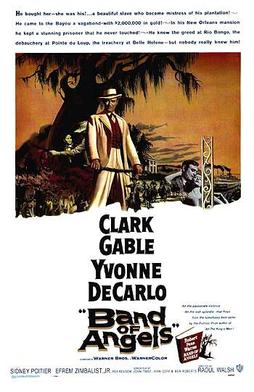
Band of Angels
Band of Angels is a 1957 American psychological drama film set in the American South before and during the American Civil War, based on the 1955 novel of the same title by Robert Penn Warren. It starred Clark Gable, Yvonne De Carlo and Sidney Poitier. The movie was directed by Raoul Walsh.[2]
This article is about the film. For the novel on which the film is based, see Band of Angels (novel). For other uses, see Band of Angels (disambiguation).Band of Angels
Original novel[edit]
Robert Penn Warren's novel of the same name was published in 1955. He had been inspired to write it by a historical event he came across while researching his novel All the King's Men. It was his first novel in five years.[3] The New York Times called it "a readable and dramatic combination of flamboyant melodrama and thoughtful reflection about moral issues and psychological factors."[4] The book became a best seller.[5] Hollywood radically changes the ending.
Production[edit]
Development[edit]
In September 1955 Warren sold the film rights to Warners for $200,000 (~$1.78 million in 2023).[6] Frank Rosenberg was assigned to produce and Susan Hayward came close to starring.[7] In August 1956 Warners put the film on its production schedule for the following year.[8] That month Frank Rosenberg left the studio and Raoul Walsh agreed to direct the film under a new contract he had signed with Warners.[9]
In November 1956 Clark Gable signed to play the lead.[10] Ava Gardner had been discussed for the female lead but in December Yvonne De Carlo was signed, on the basis of her recent performances in The Ten Commandments and Death of a Scoundrel.[11]
Filming[edit]
Location filming began January 1957 in Baton Rouge, Louisiana. Sidney Poitier joined the film in February.[12]
Critical response[edit]
The film received largely negative critical reviews, many of them comparing it unfavourably to Gable's earlier film Gone with the Wind. Bosley Crowther wrote in The New York Times that "all we get is flamboyant melodrama in big, juicy, Warner-colored blobs, with nary a thoughtful reflection at any point in the vast, romantic scene."[13] Robyn Karney gave the film a two-star review in Radio Times, insisting that "this utter tosh strains credibility to the limit and has little to recommend it".[14] Emanuel Levy wrote in 2011, "this entertaining melodrama, directed by Raoul Walsh, bears some thematic resemblance to 'Gone With the Wind', in dealing with issues of race and miscegenation, set against the backdrop of the Civil War."[15]